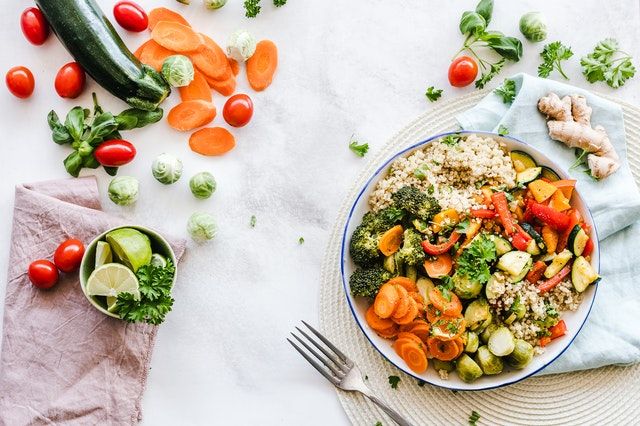National Meat-Free Week

Next week is the Dutch National Meat-Free Week, from Monday the 8th to Sunday the 14th of March. By not consuming any meat for a week during the National Meat-free Week, you lessen the environmental pressure of your (current) diet. This short-lasting dietary change therefore already contributes significantly to the betterment of the environment. Having solely vegetarian meals namely leads to the reduction of the amount of water used and of deforestation, and to a decrease in greenhouse gas emissions.
Every “carnivore” who manages to go for a week without eating meat, saves approximately:
| 101 LITRES OF WATER |
If you do not eat meat for a week, you save around 101 litres of water. This amount of water would have been used for irrigation to produce animal feed, to keep livestock and to produce your daily serving of meat. |
| 79 KILOMETRES BY CAR |
If you do not eat meat for a week, you save 13,7 kilograms of CO2-equivalent, a unit based on the global warming potential of different greenhouse gases. This emission would have taken place through the production of animal feed, the keeping of livestock, and the packaging and preparation of your daily serving of meat. An average car emits 173 grams of CO2eq per travelled kilometre. By not consuming meat for a whole week, you therefore save approximately 79 kilometres of travel with your average car. |
| 770 GRAMS OF MEAT |
The average consumer in the Netherlands consumes 110 grams of meat a day, consisting of 29 grams of beef, 55 grams of pork, and 26 grams of chicken. By not consuming any meat for a week, this means that, on average, every person would consume 770 grams less. |
If you eat meat, you eat an average of 727 animals in your lifetime. This number excludes fish and shellfish. These animals usually have to live under horrifying conditions and, because they are solely bred for their meat, have all kinds of physiological problems. If you commit to a vegetarian lifestyle, the need for this type of produce will decrease.
Fish consumption causes overfishing, which threatens the natural balance in ecosystems. Next to that, many other animals become collateral damage as a result of being caught as bycatch, including dolphins and turtles. Even if you eat farmed fish, the oceans do not remain untouched. For every kilogram of farmed carnivorous fish, multiple kilograms of wild fish are necessary as feed.
More and more people are becoming flexitarian, a diet where fish and meat are eaten interchangeably with vegetarian dishes. There are many delicious vegetarian recipes to be found online, why not try some? Not having meat and fish for a day can already have a significant positive impact on humankind, animals, and the environment! Why not try to continue with a flexitarian diet after the National Meat-Free Week has ended?
When you consistently stop eating meat once or twice a week, the difference you make for the environment and animal welfare starts to accrue. If you do not have meat for one day a week for an entire year, you will save around: 6 kilograms of meat, 587 kilometres of travel with an average car, and 750 litres of water. With all these benefits, why not try to go for 3 days a week without meat?
Even if you exercise a lot, it is still possible to maintain a healthy flexitarian diet. Do make sure that your diet includes enough iron, B-vitamins, and proteins.
Iron from vegetal produce has a decreased absorption rate when compared to animal produce. Vitamin C in fruit helps counteract this problem by increasing the efficiency of absorption rate for vegetal produce. Animal proteins have a higher quality than vegetal proteins. Vegetal proteins contain less essential amino acids (building blocks of proteins that the body cannot produce by itself). If you eat little to no meat and (animal) dairy products, you need an additional 15 grams of proteins on top of the recommended amount to make sure you get all the essential building blocks!
| NUTRIENTS | FUNCTION | ALTERNATIVES |
| Irons | Allows for the transportation of oxygen in the body during workouts. | Whole grain products (f.e. bread and pasta), rye bread, oatmeal, brown rice, couscous, quinoa, legumes (f.e. kidney beans and chickpeas), soy products (tofu, tempeh, and textured vegetable protein), vegetables, egg, seeds, nuts, and fortified foods (f.e. Roosvicee Ferro). |
| Protein | Helps with the development and maintenance of muscles. |
Combine legumes and grains or combine legumes and nuts. * Make sure to eat the combination of products within 3 to 4 hours to optimize protein intake. |
Riboflavin (Vitamin B2) | Helps with the extraction of energy from nutrients like proteins, carbohydrates, and fats. |
Yoghurt, quark, milk, and other dairy products are the most important. |
